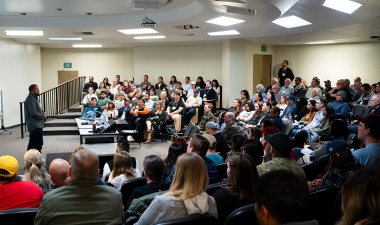MERCED, CA — Stanislaus State and UC Merced announced on Friday, April 22, a new initiative they are co-leading that aims to increase the number of young men of color who attend and graduate from college.
With elected officials that included Assemblymember Adam Gray and State Superintendent of Public Instruction Tony Thurmond, school superintendents from Stanislaus, San Joaquin and Merced counties and other regional leaders and educators present, Stanislaus State President Ellen Junn and UC Merced Chancellor Juan Sánchez Muñoz announced their partnership with The 1300 Campaign initiative during a kickoff event held in the Lakireddy Grand Ballroom at UC Merced.
The initiative aims to send an additional 1,300 young men of color to each region’s University of California and California State University within five years. The universities will partner with pre-K-12 school districts to identify and support students who are too often underrepresented and disregarded.
The campuses will strategize and collaborate with regional leaders, schools and organizations to increase the number of men of color who are eligible to apply to, accepted to and enroll in higher education.
“Today we have gathered to ignite and fuel the hopes and dreams of our young people to focus on their educational success by joining together to be a part of ‘The 1300 Campaign,’” President Junn said. “We are poised and ready to help more students from diverse backgrounds come to our campuses where they will be among many others and helped to feel welcomed, engaged and empowered to thrive and achieve their new dream of attaining a college degree.”
Chancellor Muñoz said he and President Junn are committing their institutions “to this important work of increasing equity in higher education and increasing social capital among communities of color in the Valley.”
“This project requires the will, commitment and intentionality of all the institutions in this room today,” Muñoz said. “We hope that you will invite, attract and persuade others to work with us to do more to improve pathways to higher education and lay the academic and social groundwork for economically disadvantaged and ethnically diverse students to succeed.”
The 1300 Campaign is a community-led and systems change initiative that seeks to permanently transform the historical systematic barriers that have limited opportunities for young men of color. The campaign will work in collaboration with the non-profit organization Improve Your Tomorrow based in Sacramento.
Stockton native Michael Lynch, co-founder and CEO of Improve Your Tomorrow, said the organization hopes the Northern Central Valley campaign can serve as a model for the rest of the country.
“The story of the 1300 Campaign is about leadership and bringing systems together to address a problem that has been historical not only in the Northern Central Valley, but across California and the nation,” Lynch said.
The 1300 Campaign derives its name from the 13th Amendment of the United States Constitution, which bans slavery. However, institutionalized racism, oppression and inequities have historically contributed to a mass incarceration pipeline, poor health outcomes, miseducation and limited opportunities of young men of color. As a result, boys and men of color are underrepresented in post-secondary education and disproportionately impacted by the criminal justice system.
The 1300 Campaign seeks to help young men overcome those systemic challenges.
Junn said one element of the program will include a summer academy where a cohort of 25-30 students will be invited to participate in a week of activities at both campuses in residential housing so they can experience collegiate life firsthand.
“We know through the 1300 Campaign, we have the ability to help transform lives, bridge the opportunity gap and help young men of color fulfill their promise and full potential,” Junn said. “It does take a village to get all these key pieces aligned so the pathway for students is equitable, inclusive and designed to foster successful outcomes. We can make that happen.”



